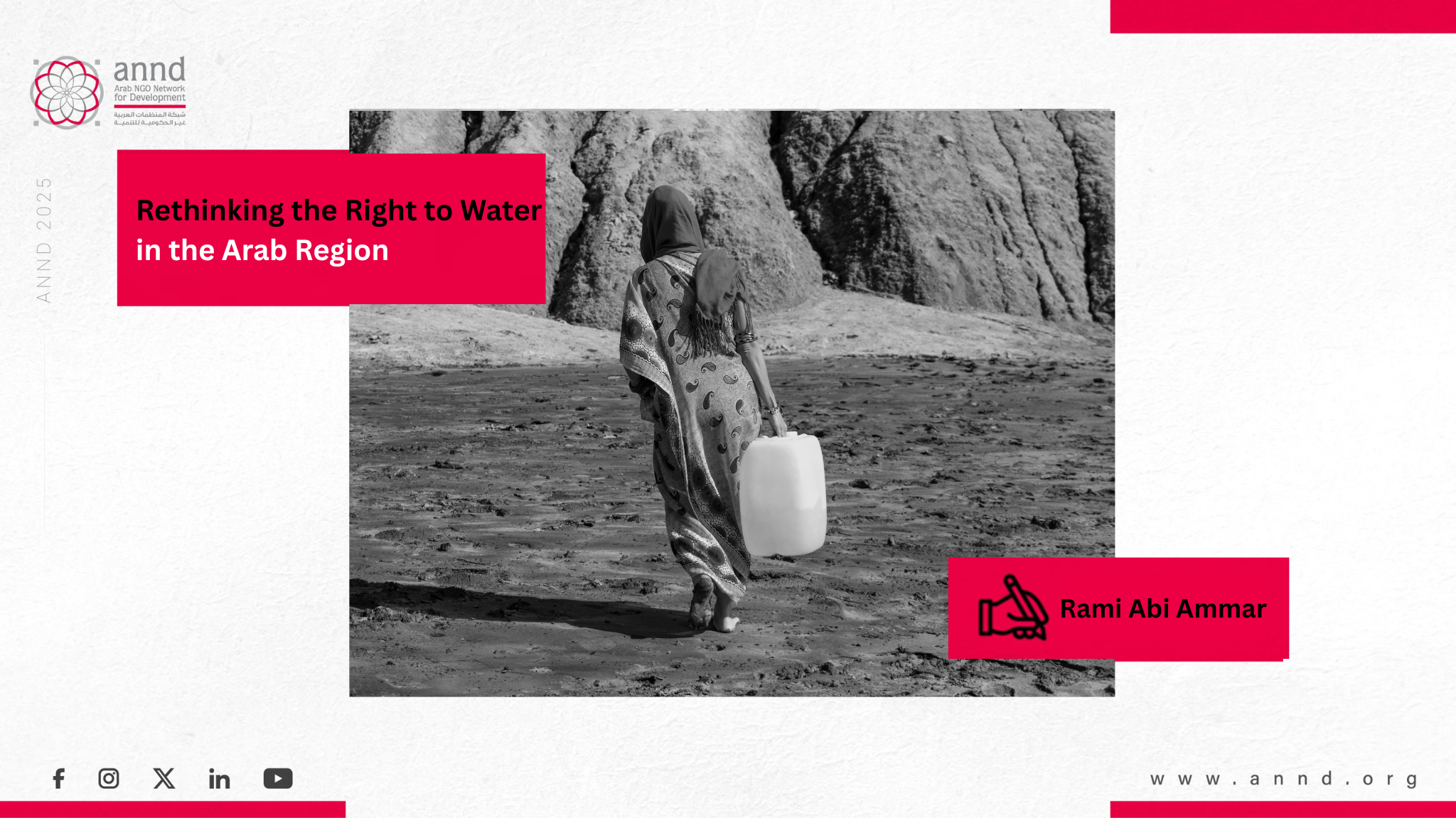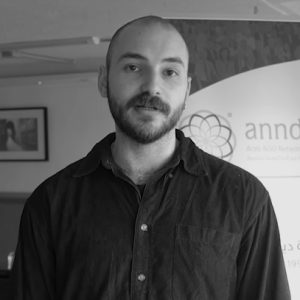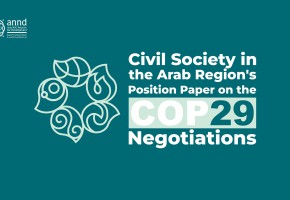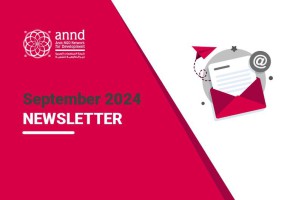Rethinking the Right to Water in the Arab Region - Rami Abi Ammar
The subject of water in the Arab region draws much concern. Mainstream conceptions of this issue define the region as the most water-stressed in the world, grappling with diminishing, scarce water resources amid growing populations. Over 60% of the Arab population lives in areas facing high or very high ‘water stress’; per capita water availability has dropped by more than 75% over the past 50 years (World Bank, 2018). Today, 13 of the 22 Arab countries fall below the water poverty line of 500 cubic meters per person per year (ESCWA, 2024).
While such statistics are alarming, the conventional indicators of water scarcity often obscure deeper structural issues contributing to unequal access to and distribution of water. Universally applied water stress metrics fail to capture water use disparities between regions or social groups. Water must not be understood as just a natural resource, but as one embedded in social and political relations, capital, and property rights. Scarcity, in this light, is often a product of centralized political control, social hierarchies, economic policy, and development patterns (Loftus, 2009). These factors influence how water is distributed, who gets access, and under what conditions. Thus, ignoring the socio-ecological dimensions of water risks deepens inequalities and accelerates depletion.
The challenge of water, therefore, is not strictly a technical one. Addressing it requires critically examining the developmental paradigms promoted by international financial institutions, which have imparted market logic and centralized control over an essential resource and a historically public good. The above is the foundation for discussing the Right to Water, the focus of the seventh edition of the Arab Watch Report (AWR) to be published by the Arab NGO Network for Development (ANND) in 2025, with research led by Roland Riachi, PhD.
The Right to Water, as affirmed by the UN General Assembly in Resolution 64/292 (2010), is the human right to safe, sufficient, acceptable, physically accessible, and affordable water for personal and domestic use. Further detailed in the Committee on Economic, Social and Cultural Rights' General Comment No. 15 (2002), this right is essential to realizing all human rights. It obliges states to ensure equitable and non-discriminatory access to water. The AWR 2025 expands this framework, advocating for a broader, unconditional right to water that includes water-based livelihoods and the democratic participation of communities in water governance.
The Arab region is vast and ecologically diverse, with wide variation in water resources and the political, social, technological, and environmental contexts shaping access. Yet, the key obstacles to realizing the right to water across this diversity, illustrated in this newsletter, can be broadly categorized into three interlinked dynamics: hegemonic control, governance failure, and neoliberalization.
Water governance in some Arab countries is characterized by hegemonic control. In Palestine, it takes an explicitly colonial form, where water is weaponized as a tool of domination and collective punishment. This strategy is a core component of Israel’s genocidal campaign in Gaza. Since October 2023, Israel has completely cut off Gaza’s water supply, along with the energy needed to operate water facilities. Occupation forces have deliberately targeted water and sanitation infrastructure—destroying approximately 89% of it—while seizing control of 74% of the remaining infrastructure. As a result, water access has plummeted by 94%, with residents receiving only 4.5 liters per person per day—less than half the emergency minimum (Oxfam, 2024).
As Ayman Rabi writes, even before its current military campaign and since 2007, the Israeli occupation’s comprehensive blockade on Gaza has denied residents access to adequate water quantities and proper water and sanitation services, restricting the entry of materials necessary for improving infrastructure and essential services, including the maintenance and development of water and sanitation systems. The situation is not too different in the West Bank, where Israel controls over 80% of water resources, service, maintenance, and development. The Occupation not only controls groundwater in the West Bank – selling it back to Palestinians -but also maintains militarized access to surface water sources. Thus, a significant discrepancy in access and use of water is produced. It is estimated that the per capita share of clean freshwater of around 3 million Palestinians in the West Bank reaches only 22.4-73 liters per day, in contrast to 369 liters per capita per day consumed by around 700,000 settlers in the West Bank (Al-Haq, 2013; PENGON, 2021).
In other parts of the region, control over water resources comes from neoliberalization, which often reproduces colonial patterns of resource extraction that deprive local populations of their right to water.
Privatization is central to this process. Neoliberal reforms have weakened state capacities and introduced corporatization, transforming water services into profit-driven enterprises governed by cost-recovery models. In her contribution to this newsletter, Sanaa Mousallem highlights how this played out in Morocco, where privatized water utilities in cities like Casablanca and Tangier led to sudden tariff increases, a lack of transparency, and the neglect of rural communities.
Market-based approaches also manifest through the commodification of water, particularly via export-oriented agricultural intensification.
Often poorly regulated, these ventures promote the expansion of water-intensive, export-oriented crops, depleting local resources, disrupting smallholder livelihoods, and compromising local and national food sovereignty. As Hala Murad documents in Jordan, many small-scale farmers have been forced to reduce production or purchase water at inflated commercial rates. Consequently, local production costs are raised, profitability is lowered, and dependence on imports increases. Meanwhile, large investors enjoy sufficient access to irrigate export crops, while small farmers face drought, debt, and dispossession.
Countering neoliberalization and hegemonic structures demands a departure from normative governance models toward approaches rooted in a deeper understanding of how power operates, how stakeholders interact, and how collective action is mobilized. In the absence of a coherent governance framework and the presence of weak mechanisms for community participation, decision-making becomes exclusionary. The voices of the poor and marginalized are systematically silenced, although they are most impacted by water scarcity. Conversely, elites and institutions are enabled to dominate water resources without accountability. Instead of promoting uniform institutional models, it is imperative to recognize and respond to local specificities, as water challenges are inherently place-based, shaped by distinct social, political, and ecological realities. In Jordan, for instance, Hala Murad highlights that community-level water user associations offer a promising model, provided they receive adequate support and oversight.
Working on the water question in the Arab region must, therefore, advance beyond the technocratic and often reductionist supply-side solutions. Engagement with political solutions should be revitalized and returned to the agendas. The Right to Water, including the dynamics of appropriation, production, and supply of water, constitutes a stake and a challenge for the region's social movements and civil society. In light of these challenges, civil society must mobilize to reclaim water as a public good, confronting the structural dynamics of control, commodification, and inequality that define its appropriation and distribution across the region.
References
Al-Haq (2013). Water For One People Only: Discriminatory Access and ‘Water-Apartheid’ in the OPT. https://www.alhaq.org/cached_uploads/download/alhaq_files/publications/Water-For-One-People-Only.pdf
ESCWA, (2024). Water challenges in the Arab region. https://www.unescwa.org/sites/default/files/event/materials/8-%20Water%20challenges%20in%20the%20Arab%20region%202400690E.pdf
Loftus (2009). Rethinking Political Ecologies of Water. https://www.jstor.org/stable/40388161
PENGON (2021). Israel's Exploitation of Palestinian Natural Resources in Violation of International Law. https://www.pengon.org/writable/uploads/Israel%27s%20Exploitation%20of%20Palestinian%20Natural%20Fact%20sheet.pdf
World Bank (2018). Water Management in Fragile Systems: Building Resilience to Shocks and Protracted Crises in the Middle East and North Africa. https://openknowledge.worldbank.org/entities/publication/97599606-df3a-58ef-8571-2a9707467048





